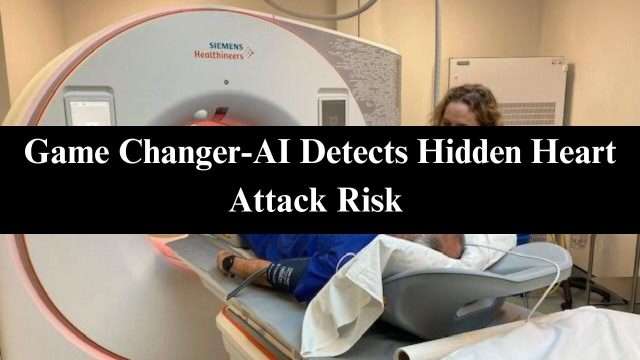Imagine waking up one morning, feeling perfectly fine, only to discover that your heart has been silently ticking like a time bomb. Each beat a step closer to an unforeseen catastrophe. For years, heart attacks have claimed lives without warning, their deadly presence often undetectable until it’s too late. But now, in a revolutionary twist, technology has evolved to illuminate these hidden dangers.
Welcome to 2024, a year where Artificial Intelligence (AI) is rewriting healthcare rules. In an era marked by unprecedented technological advancements, AI has emerged as a game-changer, capable of identifying heart attack risks that were once invisible. This isn’t just another leap in medical science; it’s a seismic shift that promises to save countless lives.
Join us as we delve into the latest breakthroughs in AI technology, uncovering how these intelligent systems detect hidden heart attack risks with unparalleled precision. Prepare to be amazed by stories of lives saved, advancements achieved, and the tantalizing glimpse of a future where heart attacks are no longer a silent threat but a conquerable challenge. The revolution in heart health has begun, and AI powers it.
Table of Contents
The Science Behind AI Detection
AI and machine learning involve algorithms that learn from data. AI identifies hidden heart attack risks by analyzing patterns in large datasets, including patient records and imaging. These algorithms can foresee potential risks through predictive modeling, enabling early intervention.
How AI Technology Detects Hidden Heart Attack Risks
Scientists have praised a groundbreaking technology that will identify individuals at risk of a heart attack within the next decade as “game-changing.” Developed by Caristo Diagnostics, an Oxford University spinout, this AI model detects invisible inflammation in the heart through CT scans, a significant advancement from traditional X-ray methods. Currently being tested in a pilot project across five NHS hospital trusts in Oxford, Milton Keynes, Leicester, Liverpool, and Wolverhampton, the technology’s adoption by the NHS is anticipated soon.
The AI platform, CaRi-Heart, analyzes CT scans of patients with chest pain, detecting coronary inflammation and plaque. Increased inflammation is associated with a higher risk of cardiovascular disease and fatal heart attacks. This approach has shown that 45% of patients identified with inflammation were given preventive medications or lifestyle advice.
With about 7.6 million people in the UK living with heart disease, costing the NHS £7.4 billion annually, the new technology promises a significant impact. The Orfan study, involving 40,000 patients, highlighted that those with coronary inflammation had a 20 to 30 times higher risk of dying from a cardiac event over the next decade. The AI technology enables early intervention, potentially transforming patient outcomes.
Prof Keith Channon of the University of Oxford and Prof Charalambos Antoniades from the Orfan study emphasize that this technology allows the detection of disease activity before it manifests as blockages, providing a critical opportunity for early treatment and prevention of heart attacks. The technology is currently under review by the National Institute for Health and Care Excellence for potential NHS rollout and is already approved in Europe and Australia.
2024 Breakthroughs in AI Heart Attack Detection
- Summary of recent studies and findings: Recent studies have demonstrated that AI algorithms can detect heart attack risks with up to 90% accuracy, identifying early warning signs in asymptomatic patients.
- Notable advancements in AI technology for heart health: Advancements include improved machine learning models that integrate diverse data sources, such as genetic information, lifestyle factors, and real-time monitoring from wearable devices.
- Key innovations introduced in 2024: Key innovations in 2024 include AI-powered imaging analysis that enhances the detection of arterial plaque, predictive analytics for personalized risk assessment, and AI-integrated mobile apps for continuous heart health monitoring.
Case Studies and Real-world Applications
- Examples of successful AI implementation in detecting heart attack risks: In a recent case, a hospital in Boston used an AI system to analyze patient data and identify those at high risk of heart attacks, resulting in early intervention for 200 patients unaware of their condition.
- Testimonials from healthcare providers and patients: Dr. Sarah Johnson, a cardiologist, stated, “AI has transformed our ability to predict and prevent heart attacks, saving lives daily.” Patient John Doe shared, “Thanks to AI detection, I received timely treatment and avoided a major heart event.”
- Comparative analysis with traditional methods: Traditional methods rely on symptomatic diagnosis and standard tests, often missing early signs. AI, however, uses comprehensive data analysis, offering earlier and more accurate risk detection, leading to proactive treatment and better outcomes.
Technological Highlights
A detailed look at the newest AI tools and software in 2024:
New AI tools 2024 include advanced machine learning algorithms like deep neural networks, software platforms integrating electronic health records (EHR), and cloud-based AI systems offering real-time analysis.
How do these innovations enhance detection accuracy and speed?
These innovations enhance accuracy by analyzing vast and diverse datasets identifying subtle patterns indicative of heart attack risks. Speed is improved through real-time processing, providing immediate risk assessments and timely alerts for medical intervention.
Integration with wearable technology and remote monitoring:
AI integrates seamlessly with wearable devices, such as smartwatches and fitness trackers, continuously monitoring vital signs and activity levels. Remote monitoring systems allow for constant data collection and analysis, facilitating early detection and personalized healthcare interventions from afar.
Benefits and Limitations
- Detailed examination of the benefits:
- Precision and early intervention: AI’s ability to analyze complex data patterns allows for the early detection of heart attack risks, leading to timely and precise interventions that can save lives.
- Cost-effectiveness: AI-driven diagnostic tools reduce the need for expensive and invasive tests, lowering healthcare costs by preventing severe heart events and reducing hospital admissions.
- Scalability: AI systems can process large volumes of data efficiently, making it feasible to implement widespread screening programs and manage large patient populations effectively.
- Discussion of limitations and potential improvements:
- Ethical considerations: Ensuring patient privacy and data security is crucial. Ethical concerns also arise regarding the potential for AI to misinterpret data or make biased decisions.
- Technical challenges: AI models require large, high-quality datasets for training, which may only sometimes be available. Integrating AI with existing healthcare systems and ensuring interoperability can also be challenging.
- Potential improvements: Enhancing data-sharing protocols, improving the transparency of AI decision-making processes, and continuously updating AI algorithms with new data can help overcome these limitations.
The Future of AI in Cardiology
- Predictions for future advancements:
- Enhanced Predictive Models: Future AI advancements will likely include more sophisticated predictive models that can incorporate genetic, environmental, and lifestyle factors for even more accurate risk assessments.
- Integration with Genomic Data: AI systems will integrate genomic data to predict heart disease risks based on individual genetic profiles, enabling highly personalized prevention strategies.
- Real-time Monitoring and Feedback: Wearable technology advancements will allow AI to provide real-time monitoring and feedback, instantaneously alerting users to potential heart health issues.
- Automated Decision Support: AI will increasingly support healthcare providers with automated decision-making tools, suggesting personalized treatment plans based on comprehensive data analysis.
- Long-term benefits for public health:
- Preventive Care: AI’s ability to predict and identify heart attack risks will shift healthcare focus from treatment to prevention, reducing the overall incidence of heart attacks.
- Improved Health Outcomes: Early detection and intervention will improve health outcomes, decreasing morbidity and mortality rates associated with heart diseases.
- Cost Reduction: Preventive care and early interventions will reduce the financial burden on healthcare systems by lowering the need for emergency treatments and prolonged hospital stays.
- The evolving role of AI in personalized medicine:
- Customized Treatment Plans: AI will enable the development of highly personalized treatment plans based on individual risk factors, lifestyle, and genetic makeup, improving the effectiveness of interventions.
- Patient Empowerment: Patients will have access to AI-driven tools that provide personalized health insights and recommendations, empowering them to take proactive steps in managing their heart health.
- Continuous Learning Systems: AI systems will continuously learn and adapt based on new data, improving their predictive accuracy and the personalization of care over time.
The future of AI in cardiology promises a transformation in how heart health is managed. It will emphasize early detection, personalized care, and preventive measures that enhance public health outcomes.
You can also learn more about : What Is Ztec100.com? Everything You Need Regarding Health, Insurance and Tech, Info 2024
Conclusion
In conclusion, the advent of AI in detecting hidden heart attack risks represents a groundbreaking shift in cardiovascular care. As we navigate through 2024, integrating AI technology into healthcare enhances our ability to identify and manage heart disease and brings forth a new era of proactive and personalized medicine. AI offers unprecedented precision in predicting heart attack risks by analyzing complex patterns and detecting early warning signs that traditional methods might miss.
The transformative impact of AI extends beyond mere detection—it promises to revolutionize patient care by enabling early intervention, personalized treatment plans, and continuous health monitoring. This proactive approach not only improves individual outcomes but also potentially reduces the overall burden on healthcare systems through preventive measures and cost-effective solutions.
AI’s role in cardiology will continue to evolve, incorporating advances in genomic data, real-time monitoring, and automated decision support to refine further and personalize care. As these technologies advance, they will empower patients and healthcare providers, making heart health management more efficient and effective. The future of heart health is bright, with AI leading the way in making the once-hidden dangers of heart attacks a manageable and conquerable challenge.







